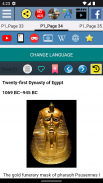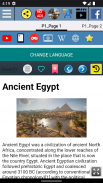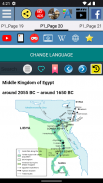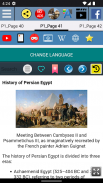










History of Ancient Egypt

History of Ancient Egypt açıklaması
Ancient Egypt was a civilization of ancient Northeastern Africa, concentrated along the lower reaches of the Nile River in what is now the modern country of Egypt. It is one of six civilizations globally to arise independently. Egyptian civilization coalesced around 3150 BC (according to conventional Egyptian chronology) with the political unification of Upper and Lower Egypt under the first pharaoh. The history of ancient Egypt occurred in a series of stable Kingdoms, separated by periods of relative instability known as Intermediate Periods: the Old Kingdom of the Early Bronze Age, the Middle Kingdom of the Middle Bronze Age and the New Kingdom of the Late Bronze Age.
Egypt reached the pinnacle of its power during the New Kingdom, in the Ramesside period where it rivalled the Hittite Empire, Assyrian Empire and Mitanni Empire, after which it entered a period of slow decline. Egypt was invaded or conquered by a succession of foreign powers, such as the Canaanites/Hyksos, Libyans, the Nubians, the Assyrians, Babylonians, the Achaemenid Persians, and the Macedonians in the Third Intermediate Period and the Late Period of Egypt. In the aftermath of Alexander the Great's death, one of his generals, Ptolemy Soter, established himself as the new ruler of Egypt. This Greek Ptolemaic Kingdom ruled Egypt until 30 BC, when, under Cleopatra, it fell to the Roman Empire and became a Roman province.
The success of ancient Egyptian civilization came partly from its ability to adapt to the conditions of the Nile River valley for agriculture. The predictable flooding and controlled irrigation of the fertile valley produced surplus crops, which supported a more dense population, and social development and culture. With resources to spare, the administration sponsored mineral exploitation of the valley and surrounding desert regions, the early development of an independent writing system, the organization of collective construction and agricultural projects, trade with surrounding regions, and a military intended to defeat foreign enemies and assert Egyptian dominance. Motivating and organizing these activities was a bureaucracy of elite scribes, religious leaders, and administrators under the control of a pharaoh, who ensured the cooperation and unity of the Egyptian people in the context of an elaborate system of religious beliefs.
Antik Mısır artık Mısır'ın modern bir ülkedir ne Nil Nehri'nin alt ulaşır boyunca konsantre eski Kuzeydoğu Afrika'nın bir medeniyet oldu. Bu küresel bağımsız ortaya altı medeniyetlerin biridir. Mısır uygarlığı, ilk firavunu altında Yukarı ve Aşağı Mısır'ın siyasi birlik ile (konvansiyonel Mısır kronolojisine göre) 3150 M.Ö. birleşmişti. İlk Tunç Çağı Eski Krallık, Orta Tunç Çağı, Orta Krallık ve Geç Tunç Çağı Yeni Krallık: Antik Mısır tarihinin Intermediate Dönemlerinde olarak bilinen görece istikrarsızlık dönemlerinde ayrılmış istikrarlı Krallıkları, bir dizi meydana .
Mısır bunun yavaş gerileme dönemine girdi sonra Hitit İmparatorluğu'nu, Asur İmparatorluğu ve Mitanni İmparatorluğu, rakip Ramesside döneminde, Yeni Krallık döneminde gücünün doruk noktasına ulaşmıştır. Mısır işgal ya da Kenanlılar / Hyksoslar, Libyalılar, Nubians, Asurlular, Babilliler, Persler Ahameniş ve Üçüncü Ara Dönem içinde Makedon ve Mısır Geç Dönem olarak dış güçlerin, bir arkaya tarafından fethedildi. Büyük İskender'in ölümünden, onun generallerinden biri, Ptolemy Soter sonrasında, Mısır'ın yeni hükümdarı olarak kendini kurdu. Bu Yunan Ptolemaios Krallığı Kleopatra altında, Roma İmparatorluğu düştü ve bir Roma eyaleti oldu, 30 M.Ö. kadar Mısır'ı yönetti.
Eski Mısır uygarlığının başarısı, kısmen tarım için Nil Nehri vadisinin koşullarına uyum yeteneği geldi. Öngörülebilir sel ve bereketli vadinin kontrollü sulama daha yoğun bir nüfusa ve sosyal gelişimi ve kültürü desteklenen artı bitkileri, üretti. Kaynaklar yedek sayesinde, yönetim vadinin mineral sömürü ve çevresindeki çöl bölgeleri, bağımsız bir yazı sisteminin erken gelişimi, toplu inşaat ve tarım projeleri çevredeki bölgeleri ile ticaret organizasyonu ve yabancı düşmanları yenmek amacıyla bir askeri ve sponsor Mısır üstünlüğünü kabul. Dini inançları ayrıntılı bir sistem bağlamında Mısır halkının işbirliği ve birliğini sağlamış bir firavun, kontrolü altında elit scribes, dini liderler ve yöneticiler bir bürokrasi oldu Motivasyonu ve bu faaliyetleri organize.

























